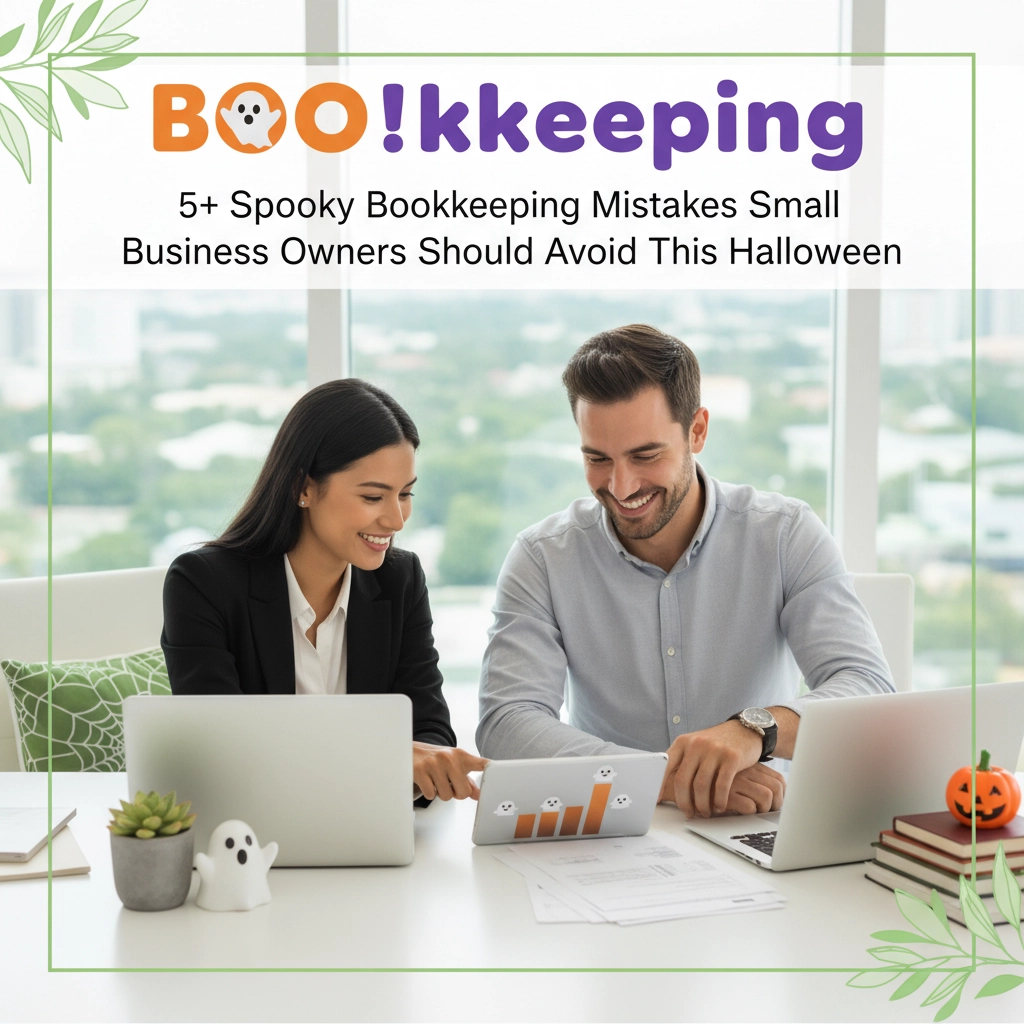BOO!-kkeeping: 5+ Spooky Bookkeeping Mistakes Small Business Owners Should Avoid This Halloween

Halloween brings ghosts, goblins, and things that go bump in the night. But for small business owners, the scariest creatures aren't lurking in dark corners: they're hiding in your financial records. These spine-chilling bookkeeping mistakes can haunt your business long after the Halloween decorations come down.
Don't let these frightening financial phantoms sink their claws into your bottom line. Here are the most terrifying bookkeeping blunders to banish from your business before they turn into full-blown financial nightmares.
1. The Phantom Bank Reconciliation: When Numbers Disappear Into Thin Air
Picture this horror story: You think you have $5,000 in your business account, but your bank statement shows $3,200. Where did that money vanish? Welcome to the curse of skipped bank reconciliations: the most haunting mistake in small business bookkeeping.
When you don't reconcile your bank and credit card statements monthly, discrepancies multiply like zombies in a horror movie. Duplicate charges, bank fees, and data entry errors pile up, creating a financial monster that grows more terrifying with each passing month.

The ghost of unreconciled accounts doesn't just mess with your numbers: it can hide fraudulent activity, overdraft fees, and missed deposits. By the time you notice something's wrong, the damage could be devastating.
The Exorcism: Set a monthly reconciliation ritual. Mark your calendar for the same day each month and treat it like a sacred appointment. Use accounting software to make the process less painful, and don't let yourself off the hook. Your future self will thank you when tax season rolls around and your books are squeaky clean.
2. The Jekyll and Hyde Financial Identity: Mixing Personal and Business Money
This shape-shifting mistake is scarier than any werewolf transformation. One minute you're buying coffee with your business card, the next you're paying business expenses from your personal account. It's a financial identity crisis that'll give any accountant nightmares.
When personal and business finances get tangled together like a spider's web, you create a mess that's almost impossible to untangle. Come tax time, you'll be pulling your hair out trying to separate legitimate business expenses from personal purchases.
The IRS doesn't find this mixing and matching amusing either. They might question the legitimacy of your business deductions, potentially triggering an audit: now that's truly terrifying.
Breaking the Curse: Open dedicated business accounts and use them religiously for all business transactions. Get a business credit card and leave your personal cards at home when making business purchases. This simple separation will save you countless hours of detective work and keep the tax demons at bay.
3. The Cash Flow Vampire: Sucking Your Business Dry
This bloodthirsty monster disguises itself as healthy profits while slowly draining your business's lifeblood: actual cash. Many business owners fall victim to this vampire by confusing profit with cash flow, not realizing they're two completely different creatures.
You might have $10,000 in outstanding invoices (showing great profits on paper), but if customers don't pay for 60-90 days, you could run out of cash to pay rent, utilities, or employees. This cash flow vampire can kill a profitable business faster than you can say "accounts receivable."
The scariest part? You might not see this vampire coming until it's too late. By the time you realize you're cash-poor despite being "profitable," you might be scrambling to make payroll or pay critical bills.
Driving the Stake: Monitor your cash flow like your business depends on it: because it does. Track when money comes in versus when it goes out. Create cash flow projections to anticipate dry spells and build a cash reserve for lean times. Invoice promptly and follow up on overdue payments before they become a problem.
4. The Vanishing Receipt Poltergeist: When Proof Goes POOF
This mischievous spirit loves to make your receipts disappear right when you need them most. Gas station receipts fade to blank paper, restaurant receipts get lost in coat pockets, and office supply receipts mysteriously vanish from your desk.

Without proper documentation, you're essentially throwing money away. Every lost receipt represents potential tax deductions that disappear into the ether. Come tax season, you'll be kicking yourself for every business lunch receipt you can't find.
The poltergeist gets particularly active during audits. Try explaining to the IRS why you don't have receipts for thousands of dollars in claimed expenses. It's not a conversation you want to have.
Ghost-Proofing Your Records: Go digital immediately. Use apps like Receipt Bank or simply snap photos of receipts with your phone as soon as you get them. Create a simple filing system: physical or digital: and use it consistently. Set up a monthly ritual to organize and categorize all your receipts before they have a chance to vanish.
5. The Data Entry Demon: Small Errors, Big Nightmares
This sneaky demon loves to corrupt your financial records with tiny mistakes that grow into monstrous problems. A misplaced decimal point here, a wrong category there, and suddenly your books are more fiction than fact.
Data entry errors multiply faster than gremlins after midnight. One wrong number can throw off your entire financial picture, making it impossible to make informed business decisions. You might think you're profitable when you're actually losing money, or vice versa.
These errors are particularly dangerous because they're often invisible until something goes seriously wrong. You might not discover them until you're preparing for a loan application or facing an unexpected tax bill.
Banishing the Demon: Slow down and double-check your entries. Use accounting software with built-in error checking features. Set up a monthly review process to catch mistakes before they multiply. If data entry isn't your strong suit, consider hiring a professional or using automated tools to minimize human error.
6. The Procrastination Monster: Leaving Everything Until Tax Season
This monster feeds on your tendency to put things off "until later." It grows stronger every month you ignore your bookkeeping, becoming a terrifying beast by the time tax season arrives.
When you neglect your books all year and then try to catch up in March, you're in for a nightmare. Missing receipts, forgotten transactions, and incomplete records turn tax preparation into a horror movie marathon: except you're the star getting chased by deadlines and penalties.

The procrastination monster doesn't just make tax time miserable: it costs you money. You'll miss deductions, pay late filing fees, and might even face penalties if you can't get your records straight in time.
Taming the Beast: Set up a simple monthly bookkeeping routine. Even 30 minutes a month beats 30 hours of panic in March. Use this time to reconcile accounts, categorize expenses, and organize receipts. Your tax preparer (and your stress levels) will thank you.
7. The DIY Disaster Zombie: When Going It Alone Goes Wrong
This zombie convinces you that you can handle all your bookkeeping yourself, even without proper knowledge or training. It shambles through your records, leaving destruction in its wake while you remain blissfully unaware of the damage.
Sure, handling your own books saves money upfront, but the DIY disaster zombie can cost you thousands in missed deductions, compliance issues, and time that could be spent growing your business instead of fighting with spreadsheets.
The zombie is particularly dangerous because it makes you overconfident. You think everything's fine until you face an audit, apply for a loan, or try to sell your business and discover your records are a complete mess.
Zombie Defense Strategy: Know your limits. If bookkeeping isn't your expertise, consider professional help or invest in quality accounting software that guides you through the process. The cost of professional bookkeeping services is often less than the cost of fixing mistakes later.
Conclusion: Keep These Ghouls Away All Year Long
These bookkeeping monsters don't just appear on Halloween: they can haunt your business every day of the year. The good news? With proper preparation and consistent habits, you can keep these financial phantoms at bay.
Remember, good bookkeeping isn't about perfection: it's about consistency and catching problems before they become monsters. Set up systems, stick to routines, and don't be afraid to ask for help when you need it.
This Halloween, instead of worrying about things that go bump in the night, make sure your books are the scariest thing about your business( scary accurate, that is.)
